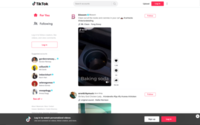
Back TikTok Afrikaans TikTok AN تيك توك Arabic تيك توك ARZ টিকটক Assamese TikTok AST TikTok Azerbaijani ТикТок Bashkir TikTok BCL TikTok Byelorussian
 | |
| Developer(s) | ByteDance |
|---|---|
| Initial release | September 2016 (in China and India only) |
| Operating system | |
| Predecessor | musical.ly |
| Available in | 40 languages[1] |
List of languages
| |
| Type | Video sharing |
| License | Proprietary software with Terms of Use |
| Website | tiktok |
 | |||||||||
| Developer(s) | Beijing Microlive Vision Technology Co., Ltd | ||||||||
|---|---|---|---|---|---|---|---|---|---|
| Initial release | 20 September 2016 | ||||||||
| Stable release(s) | |||||||||
| |||||||||
| Operating system |
| ||||||||
| Available in | Simplified Chinese, English[2] | ||||||||
| Type | Video sharing | ||||||||
| License | Proprietary software with Agreement | ||||||||
| Website | douyin | ||||||||
| Douyin | |||||||||||||||||
|---|---|---|---|---|---|---|---|---|---|---|---|---|---|---|---|---|---|
| Chinese | 抖音 | ||||||||||||||||
| Literal meaning | "Vibrating sound" | ||||||||||||||||
| |||||||||||||||||
TikTok, whose mainland Chinese counterpart is Douyin[3] (Chinese: 抖音; pinyin: Dǒuyīn; lit. 'Shaking Sound'), is a short-form video hosting service owned by Chinese internet company ByteDance. It hosts user-submitted videos, which can range in duration from three seconds to 60 minutes.[4] It can be accessed with a smart phone app.
Since its launch, TikTok has become one of the world's most popular social media platforms, using recommendation algorithms that were better than alternative apps at connecting content creators with new audiences.[5] Many of its users are young, of Generation Z. In April 2020, TikTok surpassed two billion mobile downloads worldwide.[6] Cloudflare ranked TikTok the most popular website of 2021, surpassing Google.[7] The popularity of TikTok has allowed viral trends in food and music to take off and increase the platform's cultural impact worldwide.[8]
TikTok has come under scrutiny due to data privacy violations, mental health concerns, misinformation, offensive content, and its role during the Israel–Hamas war.[9] Countries have fined, banned, or attempted to restrict TikTok to protect children or out of national security concerns over possible user data collection by the Chinese government through ByteDance.[9][10]
- ^ "TikTok – Make Your Day". iTunes Store. Archived from the original on 3 May 2019. Retrieved 3 December 2019.
- ^ "抖音". App Store. Archived from the original on 17 December 2023. Retrieved 15 March 2023.
- ^ Lin, Pellaeon (22 March 2021). "TikTok vs Douyin: A Security and Privacy Analysis". Citizen Lab. Archived from the original on 16 July 2023. Retrieved 5 January 2023.
- ^ TikTok notification
- ^ Cite error: The named reference
CNNFung2024was invoked but never defined (see the help page). - ^ Carman, Ashley (29 April 2020). "TikTok reaches 2 billion downloads". The Verge. Archived from the original on 29 July 2020. Retrieved 12 October 2020.
- ^ "TikTok surpasses Google as most popular website of the year, new data suggests". NBC News. 22 December 2021. Archived from the original on 20 September 2023. Retrieved 7 January 2022.
- ^ Miltsov, Alex (2022). "Researching TikTok: Themes, Methods, and Future Directions". The SAGE Handbook of Social Media Research Methods: 664–676. doi:10.4135/9781529782943.n46. ISBN 9781529720969.
Even though TikTok is only a few years old, it has already been shaping the ways millions of people interact online and engage in artistic, cultural, social, and political activities.
- ^ a b Maheshwari, Sapna; Holpuch, Amanda (12 December 2023). "Why Countries Are Trying to Ban TikTok". The New York Times. ISSN 0362-4331. Archived from the original on 28 November 2023. Retrieved 17 December 2023.
- ^ Peterson, Kristina; Volz, Dustin; Andrews, Natalie (15 March 2024). "TikTok's Fate Now Hinges on the Senate". The Wall Street Journal. Archived from the original on 16 March 2024. Retrieved 16 March 2024.
© MMXXIII Rich X Search. We shall prevail. All rights reserved. Rich X Search

